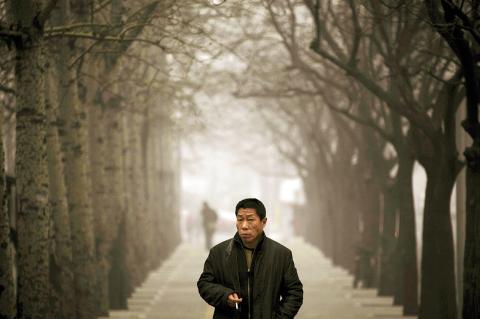Residents across northern China battled through choking pollution yesterday, as air quality levels rose above index limits in Beijing amid warnings that the smog may not clear until tomorrow.
Visibility was reduced to about 200m in the center of the capital, where mask-wearing pedestrians made their way through a murky haze, despite warnings from authorities to stay indoors unless absolutely necessary.
In a Beijing city office visited by reporters, up to 20 workers wore gas-mask style protective headgear at their desks as the cloud of pollution shrouded large swathes of the country for the second consecutive day.

Photo: Reuters
State broadcaster China Central Television (CCTV) showed vehicles using full headlights in mid-morning to light a way through the smog, mainly in badly affected Henan Province.
A total of 109 flights were canceled at Zhengzhou Airport in Henan, said CCTV, adding that the haze would last until tomorrow.
In Shandong Province, almost 2,000 passengers were stranded at Qingdao’s main airport after it shut with 20 flights canceled as visibility dropped to 100m, Xinhua news agency reported.
It is at least the fourth time a dense cloud of haze has descended on northern China this winter, with even state media repeatedly expressing anger over the issue.
The China Daily reiterated its calls for firm action yesterday, directing them at newly installed Beijing Mayor Wang Anshan (王安順), who formally took over on Monday.
“What do Beijing residents expect of their new mayor?” the newspaper asked in an editorial. “Of all the things that need improving, cleaner air will be at the top of many people’s wish list.”
Wang was quoted by Xinhua as saying: “The current environmental problems are worrisome.”
The US embassy’s air quality index reading for Beijing stood at 475 and “hazardous” at noon yesterday, after having reached 517, or “beyond index,” at 6am.
The index rates a reading over 150 as “unhealthy,” above 300 as “hazardous,” while anything over the upper limit of 500 is regarded as “beyond index.”
Meanwhile, the Beijing Municipal Environmental Monitoring Center gave the figure as 414 at noon, indicating the capital’s air was “severely polluted.”
The toxic air follows an extreme bout of pollution earlier this month, peaking on Jan. 13 when state media said readings for PM2.5, particles small enough to deeply penetrate the lungs, reached 993 micrograms per cubic meter, almost 40 times the WHO’s recommended safe limit.
At the height of the smog, many Beijing residents rushed to buy face masks and air purifiers, and doctors at two of Beijing’s major hospitals said the number of patients with respiratory problems had increased sharply during the period.
China’s pollution problems are blamed on the country’s rapid urbanization and dramatic economic development.
However, experts have raised questions over China’s will and ability to tackle car and coal use, which are seen as key causes of the phenomenon.

POLITICAL PRISONERS VS DEPORTEES: Venezuela’s prosecutor’s office slammed the call by El Salvador’s leader, accusing him of crimes against humanity Salvadoran President Nayib Bukele on Sunday proposed carrying out a prisoner swap with Venezuela, suggesting he would exchange Venezuelan deportees from the US his government has kept imprisoned for what he called “political prisoners” in Venezuela. In a post on X, directed at Venezuelan President Nicolas Maduro, Bukele listed off a number of family members of high-level opposition figures in Venezuela, journalists and activists detained during the South American government’s electoral crackdown last year. “The only reason they are imprisoned is for having opposed you and your electoral fraud,” he wrote to Maduro. “However, I want to propose a humanitarian agreement that

ECONOMIC WORRIES: The ruling PAP faces voters amid concerns that the city-state faces the possibility of a recession and job losses amid Washington’s tariffs Singapore yesterday finalized contestants for its general election on Saturday next week, with the ruling People’s Action Party (PAP) fielding 32 new candidates in the biggest refresh of the party that has ruled the city-state since independence in 1965. The move follows a pledge by Singaporean Prime Minister Lawrence Wong (黃循財), who took office last year and assumed the PAP leadership, to “bring in new blood, new ideas and new energy” to steer the country of 6 million people. His latest shake-up beats that of predecessors Lee Hsien Loong (李顯龍) and Goh Chok Tong (吳作棟), who replaced 24 and 11 politicians respectively

Young women standing idly around a park in Tokyo’s west suggest that a giant statue of Godzilla is not the only attraction for a record number of foreign tourists. Their faces lit by the cold glow of their phones, the women lining Okubo Park are evidence that sex tourism has developed as a dark flipside to the bustling Kabukicho nightlife district. Increasing numbers of foreign men are flocking to the area after seeing videos on social media. One of the women said that the area near Kabukicho, where Godzilla rumbles and belches smoke atop a cinema, has become a “real

‘WATER WARFARE’: A Pakistani official called India’s suspension of a 65-year-old treaty on the sharing of waters from the Indus River ‘a cowardly, illegal move’ Pakistan yesterday canceled visas for Indian nationals, closed its airspace for all Indian-owned or operated airlines, and suspended all trade with India, including to and from any third country. The retaliatory measures follow India’s decision to suspend visas for Pakistani nationals in the aftermath of a deadly attack by shooters in Kashmir that killed 26 people, mostly tourists. The rare attack on civilians shocked and outraged India and prompted calls for action against their country’s archenemy, Pakistan. New Delhi did not publicly produce evidence connecting the attack to its neighbor, but said it had “cross-border” links to Pakistan. Pakistan denied any connection to